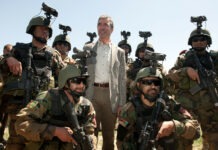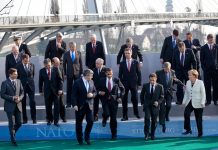Linkbox om “borgerkrigen” mellen Nord- og Sydkorea (25. juni 1950 – 27. juli 1953), som hurtig udviklede sig til et stormagtsopgør mellem FN/USA og Kina/Sovjet under den kolde krig.
(Tidsskriftcentret, juni 2010/Socialistisk Bibliotek, juli 2023-)
Leksikale mv.
- Koreakrigen (Leksikon.org)
- Koreakrigen (Denstoredanske)
- Korea-krigen, 1950-1953 (Danmarkshistorien.dk)
- Koreakrigen (Wikipedia.dk) + Korean War (Wikipedia.org)
- Korean War (Spartacus Educational)
- Koreakrigen. Af Richard Juhre (FaktaLink, april 2013, opdateret november 2017). Betalingssite, som er gratis tilgængelig enten på dit lokale bibliotek eller på din hjemme-pc efter tilmelding på biblioteket.
Artikler
Koreakriget (pdf) (Marxistarkiv, maj 2007, 14 sider). “I denna artikelsamling ingår tre artiklar, som ger en ganska fyllig, mångfacetterad och intresseväckande bild av Koreakriget.”
Korea: Krigen, der aldrig sluttede. Af Svend Vestergaard Jensen (Socialistisk Information, 19. oktober 2017; online på Internet Archive). “For at prøve at forstå må vi se på det, der stort set ikke nævnes i medierne: Korea-krigen 1950-53, hvor de nuværende grænsedragninger blev sat.”
Introduction to the New Edition of ‘The Hidden History of the Korean War’. By Tim Beal and Gregory Elich (Monthly Review, Vol.75, No.1, May 2023). “First published in 1952, I. F. Stone’s Hidden History of the Korean War was a stunning indictment of the U.S. war machine and the mass media’s unquestioning acceptance of the government’s deception. In their new introduction, Tim Beal and Gregory Elich explore Hidden History‘s continuing relevance to current events, including the rapidly escalating New Cold War.”
70 years since the end of the Korean War. Part 1 + Part 2. By Ben McGrath (World Socialist Web Site, July 26-27, 2023). “The lessons of the Korean War should not be forgotten. It is a graphic demonstration of the ruthlessness with which US imperialism will pursue its economic and strategic interests with complete disregard for human life and suffering.”
The Korean War at 70: imperialism’s legacy of bloodshed and division. By Sung-yang Park (In Defence of Marxism, 27 July 2023). “27 July of this year marks the 70th anniversary of the signing of the Korean Armistice Agreement, which halted the three-year-long, all-out conflict known as the Korean War.”
The Korean War is all but forgotten today. It shouldn’t be. By James Greig (Jacobin, August 13, 2022). “Ever since the end of the Korean War, the US has tried its best to make Americans forget it. But for Koreans, the war never really ended. The new season of the podcast Blowback aims to excavate the realities of US brutality during and after the war.”
Uncovering the hidden history of the Korean War. By Owen Miller (Jacobin, June 25, 2020). “The Korean War, which began 70 years ago today, inflicted unimaginable horrors upon the people of Korea, north and south of the 38th parallel. From carpet-bombing to mass executions, the US and its South Korean allies were responsible for some of the worst atrocities.” See also a longer interview with Owen Miller: How Korea Became a forgotten war (Jacobin, February 26, 2021)
Korean War: ‘Systematic and ruthless destruction’. By John Newsinger (Socialist Review, Issue 427, November 2017; online at Internet Archive). “It is important that we remember the war that created the belligerent North Korean regime, writes John Newsinger, and that Britain’s Labour government supported it at the time, though the public didn’t.”
Korea: still an unknown war. By Gregory Elich (MR Online, December 5, 2010). Review of Bruce Cumings, The Korean War: A History (Modern Library, 2010). “Any time that a book appears by Bruce Cumings, one of our foremost scholars on Korea, it merits attention. His latest book is particularly welcome given the recent sharp increase in tensions on the Korean Peninsula.”
Korea: the forgotten war. By Ian Birchall (Socialist Worker, Issue 2202, 22 May 2010)
“Sixty years ago a brutal war for control of Korea sucked in the United States, China and Russia – leaving a legacy of destruction and division.”
North Korea: a divided history (Socialist Worker, Issue 2073, 20 October 2007). “While North and South Korea are in peace talks, US threats towards the North remain. Ha-young Kim looks at the country’s story.”
Korea: a history of division. By Owen Miller (Socialist Worker, Issue 2023, 21 October 2006). “North Korea is facing threats from the West over its recent nuclear testing. Owen Miller looks at the history of a country torn apart by the superpowers.”
Why North Korea fears Washington. By Chris Slee (Green Left Weekly, Issue 537, May 14, 2003). Review of Jon Halliday and Bruce Cumings, Korea – the Unknown War: an Illustrated History (Penguin Books, 1990). “The 1950-53 Korean War of was one of the bloodiest in history. Between 3 million and 4 million Koreans were killed, out of a population of 30 million.”
Setting the record straight on the Korean War. By Martin Hart-Landsberg (Monthly Review, Vol.52, No.5, October 2000). Review of Hugh Deane, The Korean War, 1945-1953 (San Francisco, China Books and Periodicals, Inc., 1999 246 p.). “Hugh Deane has written a concise, political, and engaging history of the Korean war.”
Anti-communism and the Korean War (1950-1953). By Jon Halliday (Socialist Register 1984, p.130-163). “Anti-Communism leapt into action in the West to empty the Korean War
of all its essential features: rather than a civil war, it was made part of the
Cold War.”
Samtidige artikler
Aftermath of the Korean Truce (New International, Vol.19, No.4, July-August 1953)
“Why, after all, did the United States intervene in Korea? What were the results of its intervention? What other results could an intelligent and responsible person have expected?”
The war in Korea. By V. Karalasingham (Socialist Review, No.1/2, January 1951). “We can give no support to either camp since the war will not achieve the declared aims of either side. Further, so long as the two governments are what they are, viz. puppets of the two big powers, the Korean socialists can give no support to their respective puppet governments.”
The struggle of the powers. By R. Tennant [i.e. Tony Cliff] (Socialist Review, Vol.1, No.1, November 1950). “The war in Korea serves the great Powers as a rehearsal for their intended struggle for the redivision of the globe. The fate of the Korean people is a grave warning to all humanity what sufferings the march of aggressive imperialist Powers will entail.”
After Korea – what? An economic interpretation of US perspectives. By T.N. Vance (New International, Vol.16, No.6, November-December 1950). “The immediate origin of the economic pressures that have pushed American imperialism into its new course, which is without historical precedent for a democratic capitalist nation, lies in the phenomenal expansion of the productive forces during World War II and the virtual maintenance of this level of production during the last five years.”
Korea and US foreign policy: A new stage in world politics. By James M. Fenwick (New International, Vol.16, No.5, September-October 1950). “The ideal of a small, neat war in Korea is menaced not only by the Stalinists who can, for example, commit Chinese troops in Korea or create diversions elsewhere, such as in Formosa, it is resident in United States policy itself.”
Civil War in Korea: New stage in the Asian revolution. By J.B. Stuart (Fourth International, Vol.11, No.5, September-October 1950). “Not to understand the background of revolutionary torment that preceded the outbreak of the Korean war inevitably entails a misunderstanding of the character of the war itself.”
Korea and the ‘Cold War’. By Michel Pablo (Fourth International, Vol.11, No.5, September-October 1950). “The Korean events raise two principal questions which now demand an answer: what is the correct attitude, the class attitude to be adopted toward them; what are the perspectives of development of the international situation in the near future.”
Se også
The continuing Korean War in the murderous history of bombing. By Tim Beal (Monthly Review, Vol.72, No.8, January 2021). “The Korean War, which broke out on June 25, 1950, can be considered the epicenter of bombing as an instrument of war.”
North Korea, without the hacks. By Yi San (Jacobin, July 28, 2019). Review of Anna Fifield, The Great Successor: The Divinely Perfect Destiny of Brilliant Comrade Kim Jong Un (PublicAffairs, 2019, 336 p.). “Most US reporting on North Korea is inaccurate fluff produced by self-serving careerists. But a new book finally shows how to do it right.”
Imperialism and the two Koreas (Irish Marxist Review, Vol.6, No.19, 2017, p.37-49). “The inter-imperialist conflict over Korea, is expertly surveyed by Kim Young-ik from Workers’ Solidarity in South Korea.”
North Korea: a divided history (Socialist Worker, Issue 2073, 20 October 2007). “While North and South Korea are in peace talks, US threats towards the North remain. Ha-young Kim looks at the country’s story.
North Korea’s hidden history. By Owen Miller (International Socialism, Issue 109, Winter 2006, p.153-166). “This recent writing from the South Korean internationalist left is an important corrective to the prevailing views of a left that has not yet been able to disassociate itself entirely from Stalinism.”
The formation of North Korean state capitalism. By Kim Ha-yong (International Socialism; Resources, June 2006). “The central point is to understand that far from embodying a fundamentally different mode of production to South Korea or the West, North Korean society represents only a variation on capitalism: state capitalism.”
Was the North Korean economy in crisis in the 1950s? By Kim Ha-yông (International Socialism; Resources, June 2006). “To begin with the conclusion, the decade from 1950-1960 was one of renaissance that saw North Korea create a miracle from the ruins of the Korean War.”
North Korea in the 1950s: Capital accumulation and power struggles. By Han Kyu-han (International Socialism; Resources, June 2006). “Although North Korea has long called the South a US colony in its propaganda, after the war Soviet aid made up the largest part of the North Korean economy.”
Why tigers fall. By Leighton Christiansen (Internationals Socialist Review, Issue 4, Spring 1998). Review of Bruce Cumings, Korea’s Place in the Sun: A Modern History (W.W. Norton & Company, 1997, 527 p.). “Bruce Cumings attempts to unravel the mysteries of both halves of the ‘Hermit Kingdom’ in his new book.” Scroll down.
Pen/Insular Notes: History, society and politics of the Korean peninsula, and Northeast Asia (Owen Miller’s blog)
Tidslinjen 15. april 1912 om Kim-Il-Sung (Socialistisk Bibliotek)





























